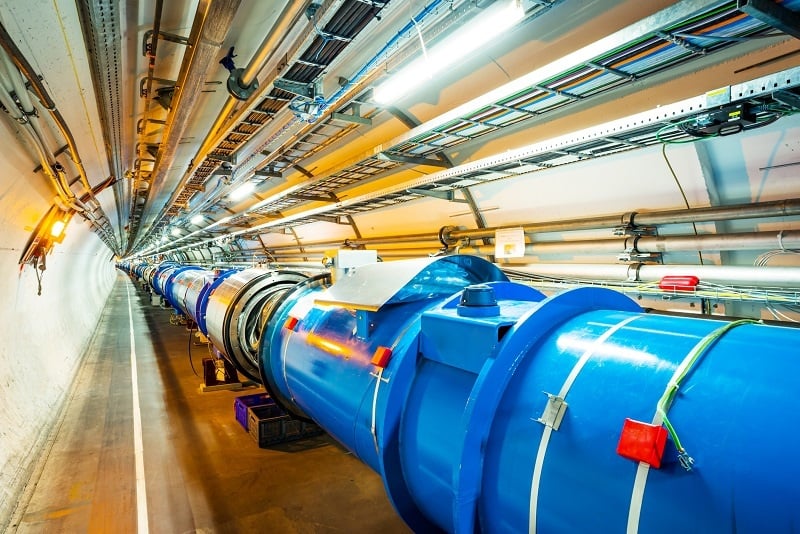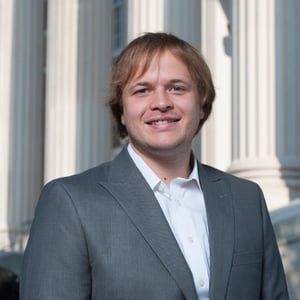
Note: this interview was condensed and edited for clarity.
You may be interested in the field of physics or curious about graduate study in the sciences more generally. But sometimes, it's hard to find answers to your questions about what graduate research work looks like or if you're smart enough to make the cut.
That's why we're taking you straight to the best sources of information: current students in our graduate programs.
James Thomas is a University Ph.D. Fellow at SMU and currently conducting research with the Large Hadron Collider at CERN. We got a chance to hear from Thomas about what life and research look like in SMU's Physics Ph.D. program.
Keep reading to learn more about particle physics, travel opportunities during the graduate years, conquering fears about grad school, and much more.
Tell me a little about yourself.
 I am originally from a Canyon, a small town in the Texas Panhandle. I did my undergraduate studies at West Texas A&M University also in Canyon. I chose to get a master’s degree from Texas A&M University-Commerce (TAMU-C) before starting a Ph.D. While at TAMU-C, I studied vector meson production in peripheral collisions. Basically, I tried to calculate what happens when charged particles moving fast pass by each other without crashing into each other.
I am originally from a Canyon, a small town in the Texas Panhandle. I did my undergraduate studies at West Texas A&M University also in Canyon. I chose to get a master’s degree from Texas A&M University-Commerce (TAMU-C) before starting a Ph.D. While at TAMU-C, I studied vector meson production in peripheral collisions. Basically, I tried to calculate what happens when charged particles moving fast pass by each other without crashing into each other.
For most of my life, I have been interested in how things work. Although no single event is completely responsible for my love of physics, one of the most influential moments of my life was visiting the Johnson Space Center in Houston as a child. I remember seeing the Saturn V rocket on its side and thinking that there was no way anything that massive could possibly get off the ground.
From that point on, I was fascinated with anything that would help me understand how such an impossibly large object could go to space. As I grew and progressed through school, my interest in physics continued to grow. My focus changed from trying to understand how rockets work to how the smallest building blocks of nature work. I love trying to understand things at their most fundamental level.
What has been the focus of your research work at SMU?
So far, my work at SMU has focused on the trigger update to the Liquid Argon Calorimeter on the ATLAS detector at the Large Hadron Collider. Two specific types of integrated circuits were developed here at SMU for the upgrade, and I have worked on the quality control procedure to make sure the circuits work as expected. In doing this, I have learned about the way the triggering system works on the Liquid Argon Calorimeter as well as developed many secondary skills, such as hardware automation and data analysis.
I have also had the opportunity to lead a small group (about 15-20) of students as we test the roughly 15,000 chips. All of these students are at various stages academically and come from a wide variety of backgrounds. Getting to know and work with such a diverse group of people has been one of my favorite aspects of my research so far.
Over my years in graduate school, I have gained a great deal of experience both academically and professionally. The experience that I am most proud of is probably the amount of travelling I have been able to do. Over the past couple of months, I have been able to spend two weeks studying instrumentation in Vancouver and am now working at CERN near Geneva.
Although my future plans are in the U.S., being able to experience different cultures around the world is a life-changing experience. All of this traveling would not be possible without the support of the physics department and the office of graduate studies at SMU.
Did you encounter any hesitations, obstacles or fears about pursuing a Ph.D. in Physics?
I absolutely encountered hesitations and obstacles about pursuing a Ph.D. in Physics. Although many of my family members have undergraduate degrees, no one has any experience with graduate school. My family is incredibly supportive of me as I pursue further education, but they have not experienced the trials and tribulations associated with a Ph.D. program.
I was also unsure about the potential job market after a Ph.D. Ultimately, I overcame this fear because of the department’s proven track record of helping graduates find careers. I spoke to several former and soon to graduate students and all of them were able to find careers that interested them.
Before starting the Ph.D. program I was scared that I simply was not smart enough to “make the cut.” Like many other disciplines, physics is difficult. I didn’t want to spend a year or two (or more) working my hardest only to find out that I would not be able to continue. Ultimately this was not a problem. The coursework I took during the first couple of years at SMU completely prepared me to start the work I do now.
Why did you choose the Physics Ph.D. program at SMU?
After visiting several physics Ph.D. programs, I chose SMU primarily because of the people here. When I came to visit, the faculty and other students at SMU made me feel welcome. At some larger universities I visited I got the feeling that the faculty didn’t particularly care whether or not I chose to attend their university.
Because the physics department at SMU is relatively small (but growing), each student represents a significant investment from the department. It was reassuring to know how much time and energy the department would put into making me the best possible physicist I can be.
My favorite part about the physics program at SMU is certainly the faculty, not just my advisor, but the whole department. They are all experts in their respective fields and they truly want what is best for me as a student while being willing to help me in any way that they can.
What are your career dreams or plans?
After finishing my Ph.D. at SMU, I plan on working in industry or at a national lab. The physics program has helped me in many ways. First, the program has been flexible in allowing me to pick and choose projects that allow me to build skills useful for my future. I have been able to develop skills in data analysis as well as hardware and software development. Although these skills may not be the primary focus of physics, I believe they will be invaluable for me after I graduate.
I have also been able to meet several individuals currently working in industry though the department. Some of them are adjunct professors and some are former students, but they are all useful contacts to have as I move through life after a Ph.D.
